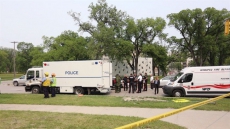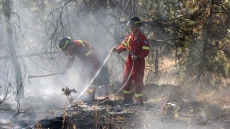TORONTO — Allowing Canadians who have lived abroad for more than five years to vote in federal elections would be unfair to those who live in Canada, Ontario's top court ruled Monday.
In a split decision, the Court of Appeal overturned a ruling that had restored the right of more than one million long-term expats to vote.
Canada's "social contract" entails citizens submitting to laws because they had a voice in making them through voting, the ruling states.
"Permitting all non-resident citizens to vote would allow them to participate in making laws that affect Canadian residents on a daily basis but have little to no practical consequence for their own daily lives," Justice George Strathy wrote for the majority court.
"This would erode the social contract and undermine the legitimacy of the laws."
Strathy said the relevant part of the Canada Elections Act aimed to strengthen the country's system of government. While it infringed on the rights of the expats, he said, the infringement is reasonable and can be justified in a free and democratic society.
Two Canadians living in the United States — Montreal-born Jamie Duong and Toronto-born Gillian Frank — launched the constitutional challenge, arguing the five-year rule was arbitrary and unreasonable. Both argued they had only left for educational and employment opportunities and still had strong attachments to Canada and a stake in its future.
In May last year, Superior Court Justice Michael Penny threw out the voting ban, noting that mass murderers have the right to cast ballots but long-term expats who care deeply about the country do not. Penny also said expats could well be subject to Canadian tax and other laws.
The Appeal Court said Penny's judgment was clouded by the government's assertion that expats "do not have the same connection" to Canada as residents.
"This caused the debate to be cast as whether non-resident citizens were worthy of the vote," said Strathy. "As a result, he overlooked Canada's democratic tradition and the importance of the social contract between Canada's electorate and Parliament."
In a dissenting opinion, Justice John Laskin said he considered Penny's judgment to be persuasive. He also said the government never argued that "preserving the social contract" justified the charter breach. Either way, Laskin said, it is not a good reason to limit voting rights.
The rule disenfranchising Canadians who have been abroad for more than five years was enacted in 1993 amid debate about the strength of their ties to Canada and their knowledge of domestic politics.
However, the five-year clock reset for those who returned even for short visits until 2007, when Elections Canada began enforcing a requirement for expats to "resume residency" in Canada to regain their right to vote abroad.
The Conservative government had argued the five-year rule was reasonable and in line with international norms.
Although the legislation technically applies to more than one million expats, records show only about 6,000 of them actually voted in the 2011 election.
On Friday, the government won another court case — that one allowing it to bar the use of voter information cards as a valid form of identification.



